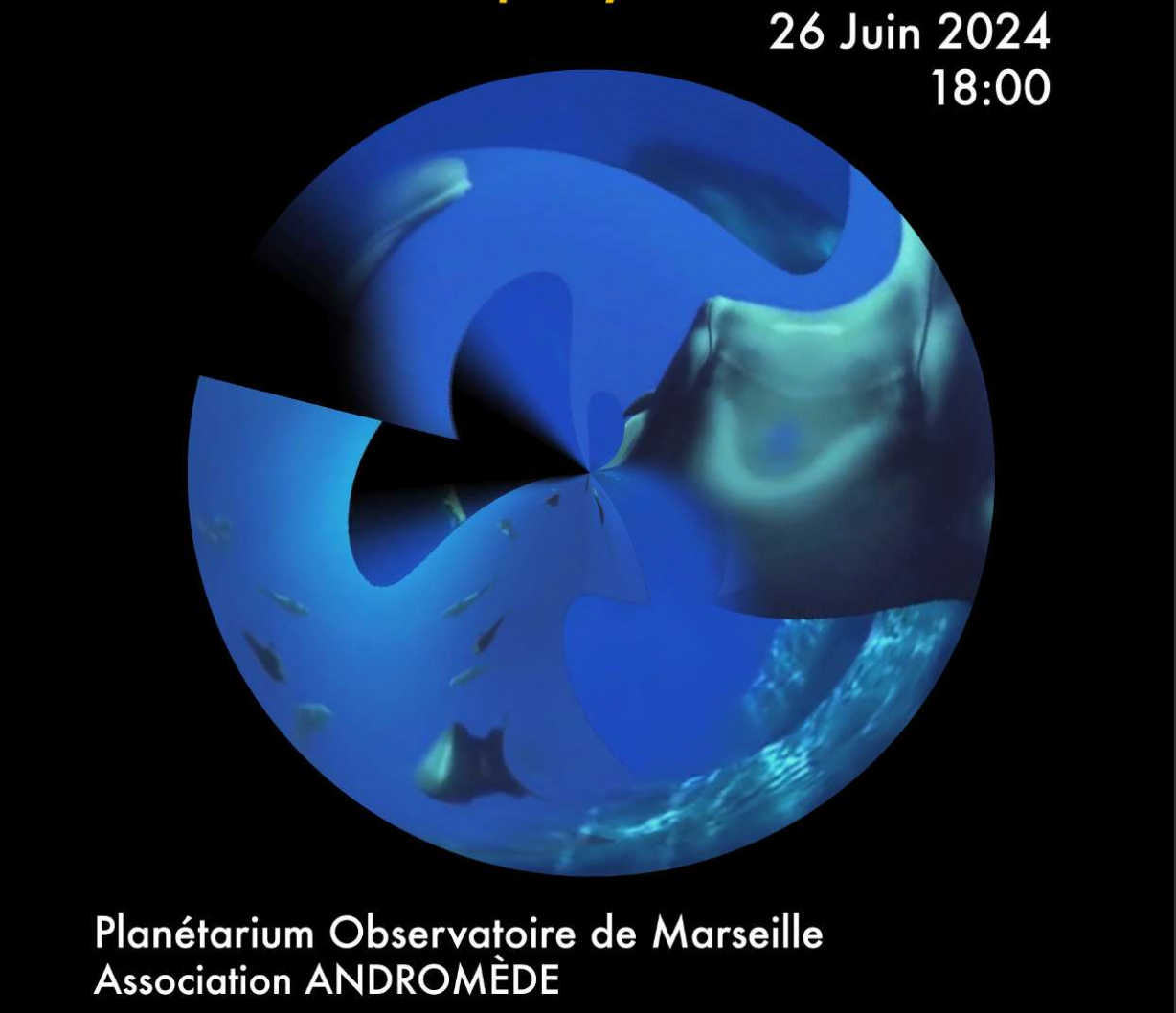
Terra-Ocean. Between Local and Global : Inside of Environmental Сollisions

Terra-Ocean. Between Local and Global : Inside of Environmental Сollisions
Wednesday, June 26, Planetarium Observatory of Marseille, 2 Place Leverrier 13004 Marseille at 6:00 PM.
The project explores Marine Biodiversity in the context of climate change. In order to choose a perspective not of cultural pessimism, but a desperate realism – perhaps in the spirit of Guattari’s ecosophy, Latour’s terrestrial coexistence, or Haraway’s question of how to live on a damaged Earth, project works to change the optics of established ways of viewing. How can immersive space and technologies help us to become more open and sensitive towards others and our environments that are affected by the Anthropocene, climate change and ongoing military conflicts? The project addresses immersion and the creation of immersive environments, sonification and translation of complex biochemical events into visual liquid elements as a research tool and an additional sensory argument, to push toward a meaningful change in anthropocentric optics and sustainable management of our vulnerable ecosystems. It brings together five audio-visual works: “The Ocean”, “Garden of Exoskeletons”, “Plankton” “Ecocide” and “Homage to Matisse” creating an immersive environment. Combining scientific data and philosophical approach, artistic work reflects the anthropogenic impact of humans on marine environments. Referring to the Gaia theory, by James Lovelock and Lynn Margulis, based on the theory of the Earth’s development by Ukrainian scientist Volodymyr Vernadsky, which is one of the foundations of ecology, and inspiring the Blue Humanities twist by Steve Mentz, the project is an invitation to shift to an ethical paradigm in favor of all the other living creatures, looking for symbiotic future with the prospects of a shared environment and blue humanities.
Special thanks to Lionel Ruiz, Thierry Perez, Veronique Cornet, Karine Leblanc, Nicolas Garcia Seyda.
Produced with the collaboration of: Iméra, Andromede / Planetarium Observatoire de Marseille, IMBE, MIO.
____
Terra Océan. Entre local et global : au cœur des collisions environnementales
Mercredi 26 juin, Planétarium Observatoire de Marseille, 2 Place Leverrier 13004 Marseille à 18h00.
Le projet explore la biodiversité marine dans le contexte du changement climatique. Afin de choisir une perspective non pas de pessimisme culturel, mais d’un réalisme désespéré – peut-être dans l’esprit de l’écosophie de Guattari, de la coexistence terrestre de Latour ou de la question de Haraway sur la façon de vivre sur une Terre endommagée, le projet s’efforce de changer l’optique des modes de vie établis. Comment l’espace et les technologies immersives peuvent-ils nous aider à devenir plus ouverts et sensibles aux autres et à nos environnements affectés par l’Anthropocène, le changement climatique et les conflits militaires en cours?
Le projet aborde l’immersion et la création d’environnements immersifs, la sonification et la traduction d’événements biochimiques complexes en éléments liquides visuels comme outil de recherche et argument sensoriel supplémentaire, pour pousser vers un changement significatif dans l’optique anthropocentrique et la gestion durable de nos écosystèmes vulnérables. Il rassemble cinq œuvres audiovisuelles : « L’Océan », « Jardin des exosquelettes », « Plancton », « Écocide » et « Hommage à Matisse » créant un environnement immersif. Combinant données scientifiques et approche philosophique, le travail artistique reflète l’impact anthropique de l’homme sur les milieux marins. Faisant référence à la théorie Gaïa, de James Lovelock et Lynn Margulis, basée sur la théorie du développement de la Terre du scientifique ukrainien Volodymyr Vernadsky, qui est l’un des fondements de l’écologie, et inspirant par le twist Blue Humanities de Steve Mentz, le projet est une invitation passer à un paradigme éthique en faveur de toutes les autres créatures vivantes, à la recherche d’un avenir symbiotique avec les perspectives d’un environnement partagé et blue humanities.
Remerciements à Lionel Ruiz, Thierry Perez, Véronique Cornet, Karine Leblanc, Nicolas Garcia Seyda
Réalisé avec la collaboration de : Iméra, Andromède / Planétarium Observatoire de Marseille, IMBE, MIO.
*****
The organizer : Oksana Chepelyk is a leading researcher of the New Technologies Department, Modern Art Research Institute of Ukraine, author of book “The Interaction of Architectural Spaces, Contemporary Art and New Technologies” (2009) and curator of International Festival of Social Sculpture, Kyiv, currently researcher Artist Protection Fund Fellow (2023-2024) at Iméra of Aix-Marseille University and supported by A*MIDEX and FIAS (2022-2023) financed by the European Commission in the frame of the Marie-Skłodowska-Curie Actions (COFUND Programme).
Oksana studied art in Kyiv, followed a PhD course, Amsterdam University, Banff Centre, Canada, Bauhaus Dessau, Germany, Fulbright Research Program at UCLA, USA.